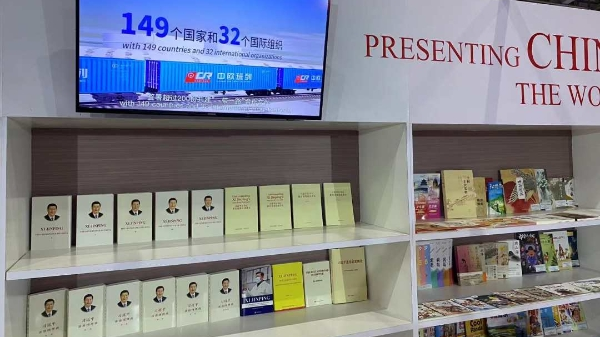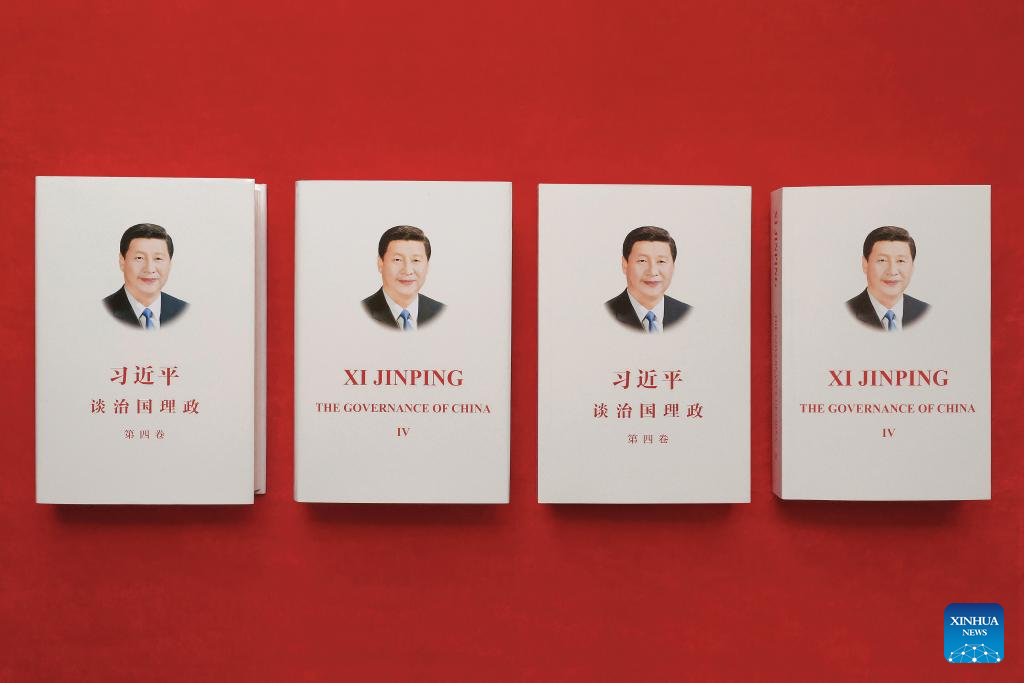
The Chinese and English versions of the fourth volume of "Xi Jinping: The Governance of China" are on exhibit at the Indonesia International Book Fair in Jakarta. /People's Daily
The Chinese and English versions of the fourth volume of "Xi Jinping: The Governance of China" are on exhibit at the Indonesia International Book Fair in Jakarta. /People's Daily
Editor's note: Martin Albrow is the author of China and the Shared Human Future: Exploring Common Values and Goals. The article reflects the author's opinions and not necessarily the views of CGTN.
With this fourth volume of The Governance of China, the regular appearance of President Xi Jinping's speeches has established itself as a world publishing event. As his stature as a thinker has grown in parallel with his influence on world affairs, the attention of all serious political thinkers will focus on the intellectual contributions he is making to the theory of the modern state in a globalized world.
This foreign writer has enjoyed the privilege of reviewing the three previous volumes. In the past, I have stated that Xi has breathed new life into the concept of governance by exploring the whole range of concepts that underpin a healthy society, to enable its people to pursue their values and share their aspirations for peace and security.
At the same time, he has placed ever increasing emphasis on the contribution China is making to safeguard the future of human beings on a planet they have endangered through their own actions. Eco-civilization is the Chinese concept that makes sustainable development a realizable project. Creating a balance between humanity and nature is a concept with deep roots in Chinese culture and Xi offers the practical example for today in the Yangtze River Economic Belt.
One of the greatest strengths in Xi's thought is how he combines the wisdom and depth of experience of China, going back millennia, with the Marxist ideas that developed in the West under the impact of modernity. This is a dynamic view of the relation of ideas to reality, schooled in an understanding of the past, and then applied with the message that Marxism itself has to keep up to date with the changing times.
In the West, recently one British national leader was fond of quoting ancient literature to boost his own image and entertain his audience, rather than to illustrate a principle. There could be no greater contrast in the use of the classics than with Xi. He adopts a sentiment from Chen Shou of the Western Jin Dynasty over 1,700 years ago in support of people's democracy.
It is in relation to democracy that this fourth volume of Xi's speeches develops its challenge to the West to the greatest degree yet. He states emphatically that democracy is a "shared human value and an ideal that has always been cherished by the Communist Party of China (CPC) and the Chinese people." He contrasts this with what Deng Xiaoping called the "democracy of monopoly capitalism."
These are highly abstract and general statements but they introduce much more detailed comparisons of Chinese socialist democracy and Western systems. There is no one system and every country must develop the institutions that match its history and culture.
In the case of China, Xi points to five basic principles upheld by the CPC: that people's democracy is the lifeblood of socialism; that the people run the country; that Chinese socialism conforms to national conditions; that by means of elections and voting all sectors of society arrive at a consensus; leveraging the strengths of socialist democracy safeguards Party and country's prosperity and long term stability.

The fourth volume of "Xi Jinping: The Governance of China" in both Chinese and English. /Xinhua
The fourth volume of "Xi Jinping: The Governance of China" in both Chinese and English. /Xinhua
It is a sign of the continuing development of Party thinking that Xi writes of "whole process people's democracy" and how it is integrated with "results-oriented democracy." Democracy covers all sectors of society. In it the Party is asked to expand participation by the people in the people's congresses as they are essential to the political vitality of China. This is a step forward beyond the earlier emphasis on consultative democracy.
One thing I have always admired in Xi's approach has been his readiness to address younger people and to enlist their support and enthusiasm for the Chinese Dream as he did in a speech on the centenary of the Communist Youth League of China. Earnest study is part of it. And it works.
I recall a conference I attended in Wuhan in 2019. There was to be a social event in the evening. Youngsters there were excited by the prospect. "Will you be there?" I asked one young person. She said not. "Why ever not?" I asked. "I must complete my assignment the Party has given me," She replied.
In his speech, Xi says young people in the Youth League have to learn from the Party's experience and apply it for their own self-improvement. They should do this with the help of the League which itself will always look to set high standards in self-governance in a spirit both of reform and to reflect the spirit of the times.
For Western observers, the frequent allusions to spirit in Xi's speeches and generally in Chinese public discourse are striking for a country that follows Marxism. But Marx never denounced spirit, only its distortion in oppressive religious doctrines. Today, in the West the call on collective spirit is largely confined to sport!
Xi's fourth volume is the most confident statement yet for the mission and prospects of the Chinese nation. It is directed to the people of China but such is their historic experience and recent achievements that the rest of the world should regard it as an example of what is possible. It is an inspiration for the common effort to secure our shared future on this earth.
(If you want to contribute and have specific expertise, please contact us at opinions@cgtn.com. Follow @thouse_opinions on Twitter to discover the latest commentaries in the CGTN Opinion Section.)